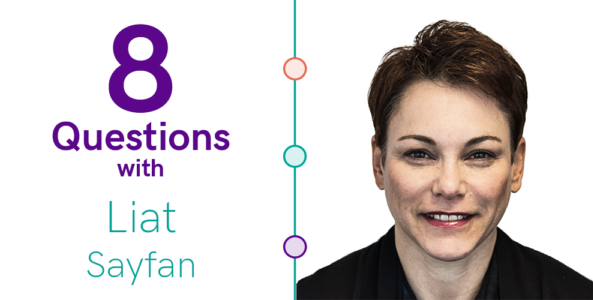
8 Questions with Liat Sayfan
In “8 Questions With…,” we share a brief Q&A with a staff member. In this edition, we hear from Liat Sayfan, PhD, Senior Data Analyst, who joined the Rosov Consulting (RC) team in 2015 and has a diverse and rich background designing and conducting research studies with varied quantitative and qualitative methodologies and statistical tools.
1. What’s your area(s) of expertise and how has it been beneficial and led to success in your work?
My background is in developmental psychology, early childhood education, and statistics. This combination is extremely useful in my role as a senior data analyst at Rosov Consulting. We work closely with people of different ages, and my experience in developmental psychology comes in very handy. I use my statistics and social science research expertise on a regular basis when developing surveys and analyzing their results using quantitative methods.
2. What experiences have led you into your current career path?
I spent most of my career prior to joining RC in academia. I earned my PhD in developmental psychology, Master’s degree in childhood education, and BA in statistics and psychology. I worked for many years as an adjunct professor teaching statistics, research methods, and a variety of psychology courses. I enjoyed teaching, but I wanted to taste the world beyond academia while still continuing to do research and take advantage of my education. My role as senior data analyst is a perfect blend of teaching others on aspects related to our work and personally doing the work.
3. What do you like learning about most through your work?
I like to learn about new Jewish educational programs, how participants experience these programs, and how we can help our clients gain insights about the effectiveness of these programs. I also like to expand my quantitative skills and learn new statistical methods to better understand the data. Last year, I took a data science and programming course that expanded my toolbox of data analysis.
4. What do you like most about working at Rosov Consulting?
I like many things at Rosov Consulting, but mostly I like my colleagues. Everyone is smart, professional, and passionate about our mission. I feel like we are one big family, and we all collaborate very well. This is especially impressive to me because we are distributed across multiple continents, and we have multiple people working in the East Coast, West Coast, and Israel. And as I mentioned before, I like being able to both teach others and do the work myself—seeing what the quantitative data tell us.
5. What are some challenges of your work?
I enjoy the challenge of translating complex and layered numerical analysis results into clear and accessible reports that our clients can easily understand and take action on. It is not easy and often takes several rounds, but the end result justifies the effort.
6. What have been the biggest changes in the field and/or your work specifically since you started?
The biggest change in the field is that more and more people appreciate the value of data-driven decision making. To account for this demand, Rosov Consulting has grown a lot since I joined 5 years ago. I do a lot of hands-on quantitative analysis work, but my responsibilities have expanded to include supporting, mentoring, and teaching members of the Rosov team. I also lead projects now, which requires a different set of skills, and it’s rewarding working closely with our clients.
7. How do you think your job and/or the field might change in the next 10 years?
It’s difficult to make predictions, especially about the future, as a famous person once said. I believe we will continue to see the trend where people want better data collection using modern technology, such as tracking participation in activities, while trying to respect participants’ privacy by making sure access to data is secure and by consent only.
8. What do you think is essential reading to excel in your field?
It’s important to stay current with the state of Jewish education, and eJewish Philanthropy offers good insight in this regard. For quantitative analysis, statistical textbooks are an essential reading. I also like to participate in webinars and read articles from The Analysis Factor.




